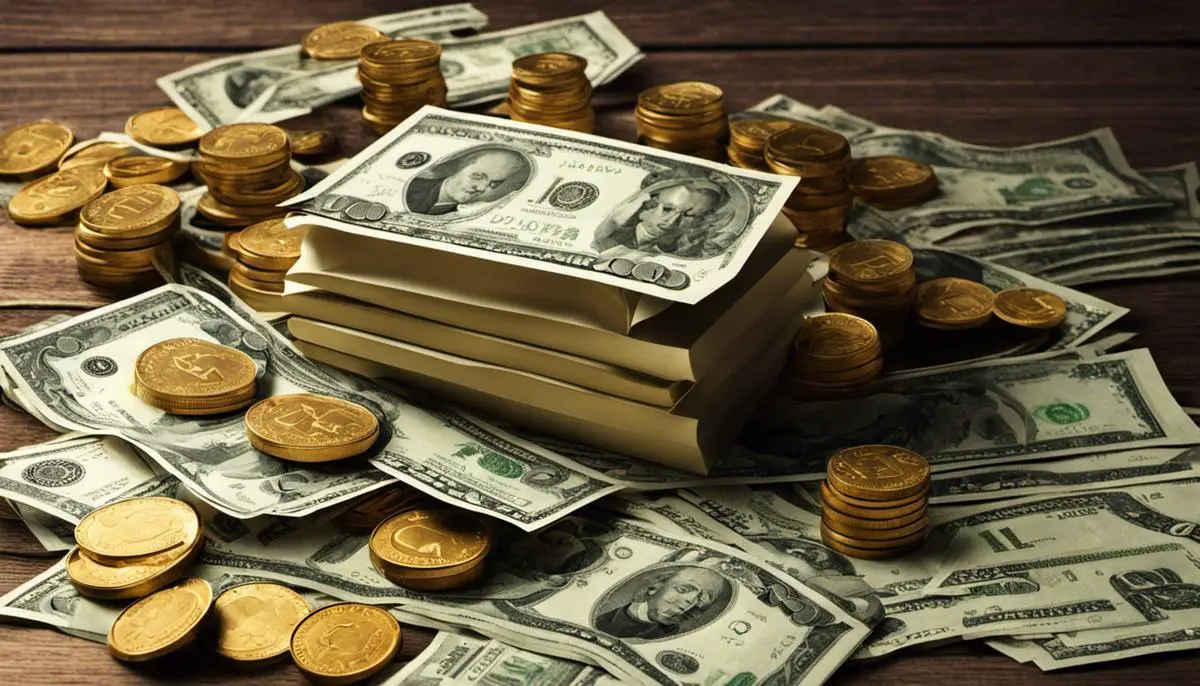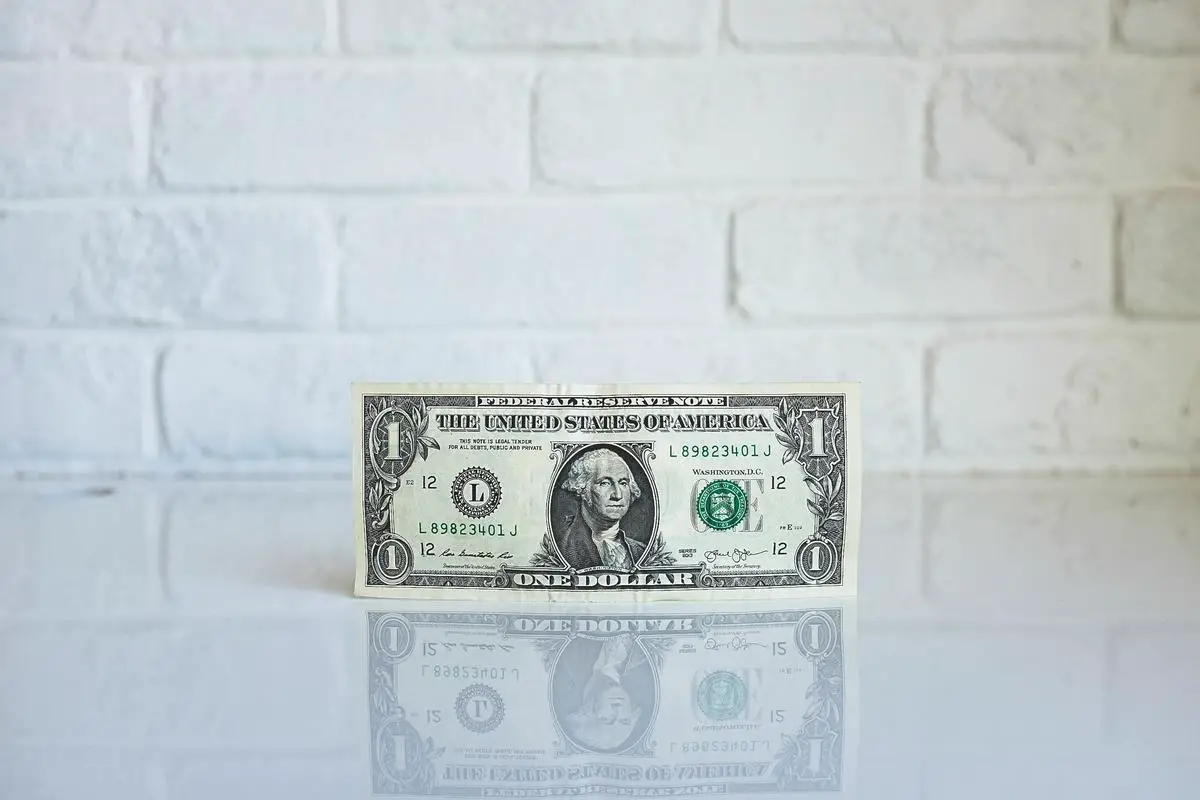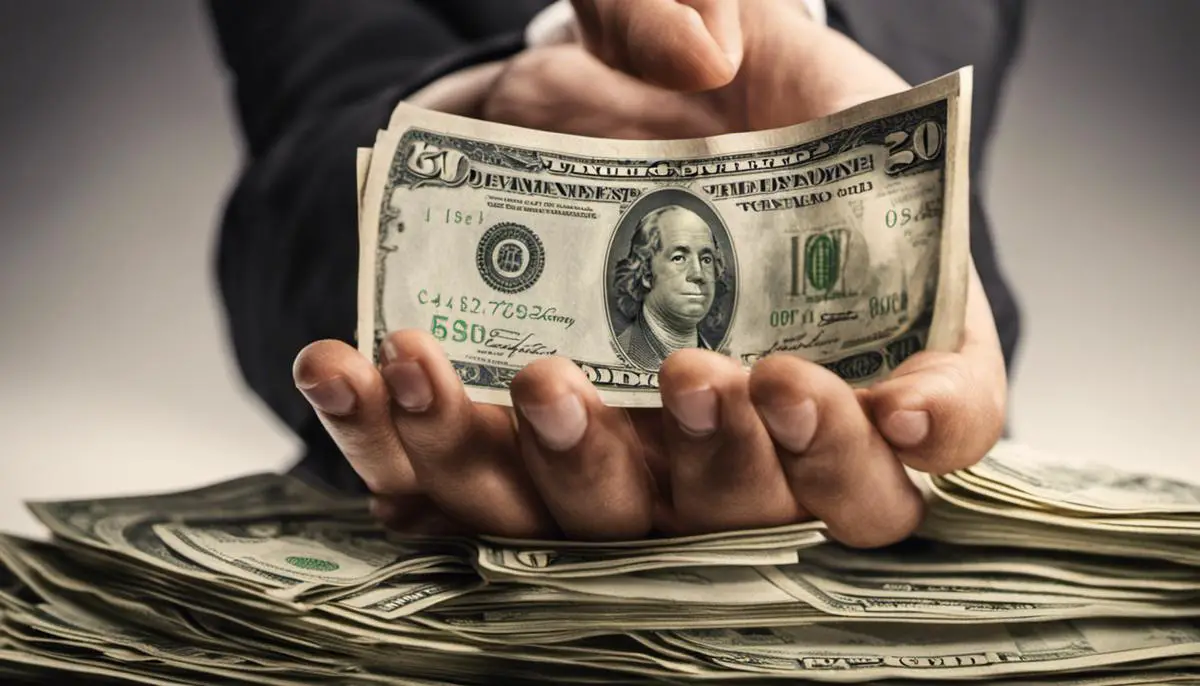Interpreting the symbolism of paper money in dreams can be a fascinating journey through the labyrinth of the subconscious mind. Engrained within our psychological fabric, this symbol can elicit profound insights into our desires, fears, and ambitions. Thoroughly researched from diverse cultural, historical, and psychological viewpoints, this exploration delves deep into the symbolism of paper money in dreams. It’s a subject steeped in complexity, extending its roots from personal psychology to broader socio-cultural contexts. From understanding the notions of wealth, power, and control to the renowned theories put forth by eminent psychologists like Jung and Freud, this journey promises to be rich with transformative insights.
Paper Money Symbolism in Dream Interpretation
The Symbolism of Paper Money in Dreams: An Interpretative Analysis
Paper money: a physical manifestation of value, potent with symbolism in waking life and the world of dreams alike. Drawing from the wealth of psychological and neurological research available, this article seeks to decipher what paper money may symbolize in our subconscious dream states based on extensive studies in dream interpretation.
At the heart of understanding dreams, and by extension symbols like paper money, sits the renowned psychologist, Carl Jung. His concept of collective unconsciousness regards dreams as reflections of universal symbols or archetypes inherent to all human beings. Within this archetype paradigm, paper money has been interpreted to represent energy, opportunity, and self-worth.
Symbolically, paper money’s tie to energy pertains to its exchange value. Extensive research suggests that paper money in dreams can symbolize mental or emotional energy exchanged in relationships or other life situations. For instance, a large sum may indicate a significant emotional investment, whilst losing money could signify perceived issues in maintaining a healthy balance in relationships or tasks.
On the realm of opportunities, money in the dream-scape is connected to potential unexploited resources or unfilled aspirations. Presence of paper money in dreams may signify unexplored activities, latent talents, or missed opportunities. Dream research supports these interpretations by identifying positive correlation between dreams of finding paper money and individuals making significant life transformations or discovering previously unnoticed skills in their waking lives.
Paper money also performs as a powerful symbol of self-worth and self-esteem according to many dream interpretation theorists. The amount of money portrayed in the dream can reflect one’s subconscious self-evaluation. An abundance of paper money may symbolize high self-regard and confidence, while the absence or loss of money may suggest feelings of insecurity or inadequacy.
Crucially, the psychological perspective emphasizes that dream interpretation is subjective and contextual, affected by both the individual’s personal circumstances and their cultural milieu. Paper money, for example, may carry different symbolic weights in societies with different economic systems. This comprehensive understanding of symbolism, considers both individual predispositions and socio-cultural influences.
Recent advances in neuroscientific research have expanded our understanding of dreams, and by proxy, dream symbolism. Neurologically, dreaming about paper money could result from the brain’s nightly ‘sorting’ of information related to economic transactions or work-related events, where money is central, reflecting daily experiences as well as deeper symbolic meanings.
To navigate the labyrinth of dream interpretation, both psychological and neuroscientific findings are instrumental. As a symbol, paper money in dreams can elucidate one’s self-esteem, reflect their relationships, reveal latent opportunities, and even serve as artifacts of the brain’s nocturnal clean-up. As researchers delve deeper into the complexities of dream symbolism, the aim remains to understand our subconscious’s coded messages better, hoping to shed light on ourselves and our shared human condition.

Psychological Perspectives on Dreams about Paper Money
Building upon the excellent groundwork established by Carl Jung’s concept of the collective unconscious, further psychological inquiry reveals additional significant interpretations of dreaming about paper money. Dig deeper into this intricate web of symbolism and it soon becomes clear – dreams about monetary instruments manifest as secret portals to our internalized reality.
Psychology often recognizes paper money in dreams to be emblematic of power and psychic energy. This traces back to Freud’s psychoanalytic theory that dreams are largely fueled by desire and power dynamics. Therefore, sometimes the appearance of paper money may denote a power shift or a transition of control within the subconscious plane.
Anxiety about economic stability too can manifest in dreams as missing or losing money, a reflection of real-world concerns invading the subconscious mental framework. Prevalent in periods of financial instability, these dreams reflect our internal efforts to mitigate psychological tension and restore emotional balance.
The appearance of counterfeited paper money presents another point of curiosity. These dreams can often denote a presence of deceit or falsity in one’s subconscious mind. It may be reflective of falsified self-worth or dishonest relationships, highlighting an urgent need for self-reflection, acceptance, and revaluating personal connections.
Expanding the lens of understanding, we also consider the influence of cultural milieu on monetary dreams. In societies where material wealth is emblematically associated with success and accomplishment, dreams about paper money may become more frequent, representing a subconscious endorsement of these societal values.
Scouting the frontiers of neuroscience, research points towards the crucial role of the limbic system, involved in forming and processing emotions in response to financial transactions. Simultaneously, the prefrontal cortex, integral to decision-making processes, participates in constructing these dream scenarios. The fascinating interplay of these brain regions gives dreams about paper money their unique significance.
In conclusion, despite the apparent mundanity, dreams about paper money are a microcosm of immense complexity embodying a symbolic language that offers an intriguing navigation through one’s psyche. These dreams evoke layers of implications, symbolizing power dynamics, reflective introspection, societal influences, and stress responses. Further, they serve as dynamic interfaces between neuroscience and psychology, creating a comprehensive understanding of dream symbolism. Ultimately, as we discern, inquire, and interpret, dreams continually illuminate the transcendent puzzles of our subconscious mind.

Photo by neonbrand on Unsplash
Impact of Socio-Cultural Background on Money Dream Interpretation
Delving further into the influence of socio-cultural background on the interpretation of dreams involving paper money, consider the societal norms and class systems that permeate the individual’s day-to-day living. As per Bourdieu’s theory of Social Distinction, the concept of monetary value and status is crucially intertwined with the individual’s position within their society. This societal-standing inevitably infiltrates their subconscious, thereby affecting the significance of paper money within their dreams.
In societies with high economic disparity, dreams that involve paper money are often laced with intense emotions revolving around financial insecurity and aspiration. Conversely, in societies that prioritize collective achievements over personal wealth, dreams of paper money may revolve more around communal obligations and responsibilities.
Richard Dawkins’ concept of memetics – the idea that cultural information spreads through a societal ‘meme pool’ – offers additional insight into this puzzle. The information, including attitudes towards money, that resides within an individual’s ‘meme pool’ can generate various symbolic interpretations of paper money in dreams. For instance, in commercialized societies, where money has a central role, the populace might be more prone to dreams involving money reflecting ambition or fear.
Cultural metaphors too can profoundly color the dream scene. Just as American culture reveres the ‘almighty dollar’, other cultures have ingrained societal norms around cash handling. In Japan, for example, where there’s deep respect for money, a dream involving carelessly handled paper money can symbolize dishonor or broken trust.
Delving into the role of cognitive processing, it’s expedient to take into account Kahneman’s dual process theory. According to this theory, automatic, intuitive thinking (System 1), and slow, rational thinking (System 2) jointly participate in decision-making processes. Since dreaming is largely driven by the automatic system, System 1 can generate dream content based on ingrained socio-cultural perceptions towards money.
Conversely, the interpretation of these dreams, often occurring in waking consciousness, tends to involve System 2, and hence, is more likely to be influenced by analytical thought processes, including personal history and cultural understanding.
Lastly, recall the relevance of individual and group identities in interpreting dream content. The concept of social identity, proposed by Tajfel and Turner, asserts the fundamental role of group affiliation in shaping an individual’s self-conception. Hence, dreams about paper money in individuals strongly identified with a particular socio-economic group can reveal insights about group dynamics and collective preoccupations.
In essence, the symbolic imagery of paper money in dreams is multi-faceted, a rich tapestry woven from the fibers of societal norms, economic structures, cultural metaphors, cognitive processes, and individual histories. Its manifestation and interpretation can be as varied and nuanced as the human psyche itself, hinting at the sheer depth and diversity of human experience straddling the conscious and subconscious realms.
In our relentless pursuit of understanding the human subconscious, the interconnected fields of psychology, neuroscience, sociology, and cultural studies offer invaluable perspectives. As long as dreams continue to intrigue and mystify us, our quest for unraveling their enigmatic symbolism remains unending.

Practical Application of Money Dream Interpretation
Having delved into the multiple facets of the concept of paper money in dream interpretation, we must now pivot our focus to tangible, everyday applications of these concepts.
An understanding of the symbology of paper money in dreams can enrich everyday life by fostering heightened self-awareness. Consider dreams about paper money as an introspective lens, illuminating latent desires, anxieties, and self-perceptions, subsequently informing one’s response to real-life situations. Gaining insights about the mind’s imagery of self-worth, power dynamics or societal influences could inevitably furnish tools for personal growth and development.
Equally noteworthy is the applicability of this understanding in a clinical setting. Here, dream interpretation functions as a therapeutic tool, capable of mining for repressed memories or emotions in patients afflicted by trauma or neurotic disorders. Oftentimes, individuals may consciously overlook or ignore their distressing sentiments. These unresolved feelings, however, may surreptitiously permeate their subconscious, manifesting through symbols like paper money in dreams. Dialing into these subconscious messages could puncture the surface of their pretense, consequently paving the way for efficacious therapeutic intervention.
Further, dreams about paper money could serve as a diagnostic tool in assessing an individual’s mental health. For instance, recurring dreams involving missing or losing money could potentially denote persistent anxieties about economic stability, signaling the onset of anxiety disorders or stress-related conditions. Likewise, dreams about counterfeited money might reflect an individual’s subconscious preoccupations with deceit or duplicity in their personal life.
Moreover, in counseling settings, understanding the symbolism of paper money in dreams can help unravel underlying power dynamics within relationships. Exchanging paper money between individuals in dreams may symbolize emotional transactions covering a wide spectrum ranging from vulnerability to exploitation.
An understanding of socioeconomic influences on dreams about paper money can also aid in the effective counseling of individuals from diverse economic and cultural backgrounds. Recognizing the impact cultural metaphors or societal norms can influence the interpretation of money in dreams helps the clinician in getting a comprehensive glimpse of the clients’ reality, thus promoting empathy over sympathy.
Finally, on considering the role of various brain mechanisms in the formation and interpretation of dreams, one can appreciate the way our cognitive apparatus shapes our perception – a realization that could affect our daily interactions or decisions about various life situations.
In conclusion, the exploration of paper money symbolism in dreams serves not merely as a fascinating intellectual endeavor, but an exercise with significant applications in our daily lives and in various clinical settings. Its interdisciplinary nature, weaving psychology, neuroscience, sociology, and cultural studies into a comprehensive discourse, imbues it with practical relevance that can aid in resolving mysteries not just of sleep but also of waking life.

Stepping back from this insightful journey through the world of dream symbolism, it becomes clear how significant dreams about paper money can be. Money’s role as a symbolic language of our subconscious reveals its powerful position in our psychic architectures. However, the key to unlocking this treasure trove of insights lies in the artful interpretation of these dream symbols. Whether it’s for personal self-discovery or for professional psychoanalytical practice, understanding the symbols our dreams present to us can unlock extensive knowledge about our underlying textures of subconscious thoughts and feelings. Drawing from diverse socio-cultural contexts and psychological theories, this discussion injects a new level of depth into the age-old practice of dream interpretation.
